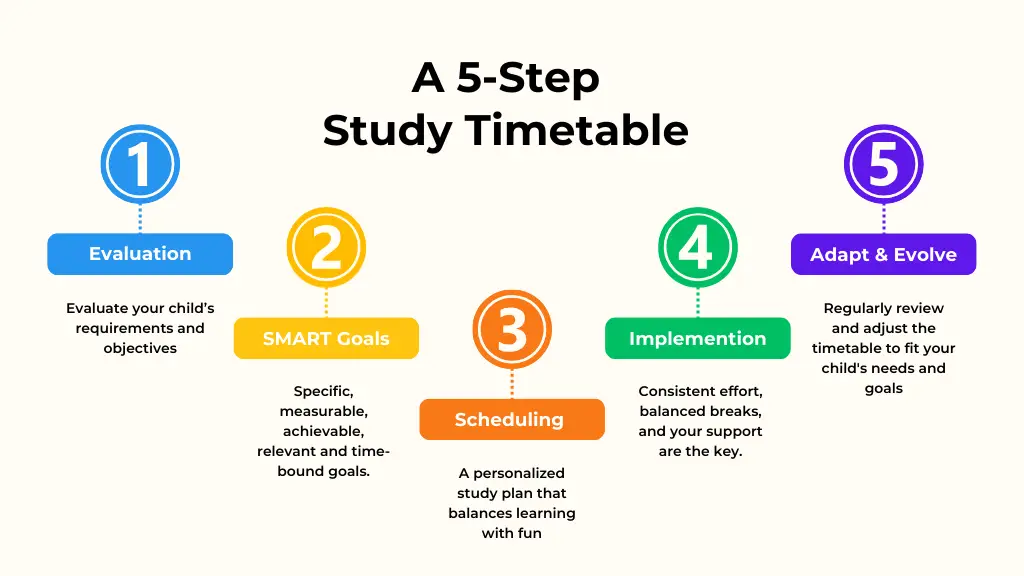A Perfect 5-Step Study Timetable for Your Child
- Parents\Students
- July 26, 2024
- Viva Education

Have you ever wondered if there are just enough hours in a day for your child to get everything done?
You would say ‘yes’ because as a parent, only you know how important it is to provide your child with the support they need to succeed academically. So, we are here to help you with one of the most effective ways to support their learning journey by creating a well-structured study timetable.
Explore and find out with us how you can come up with the ideal study schedule for your child!
The Importance of a Well-Structured Timetable
Imagine your child approaching homework with confidence, and knowing exactly when and how to tackle each subject. A well-structured study timetable can turn your imagination into a reality by laying a strong foundation for their academic journey. Establishing a routine certainly helps reduce stress and uncertainty for both you and your child.
A major advantage of having a structured timetable is that it ensures adequate time for each subject, prevents last-minute cramming and enhances understanding and retention. It also fosters self-discipline, a valuable quality for future success.
For parents, a structured timetable means more quality time with their child and a more predictable schedule, benefiting the whole family.
5 Easy Steps for Creating the Perfect Study Time Table

Developing a timetable for study is not merely about scheduling study time, but it’s also about changing your child’s academic experience. Discussed below are the five easy steps that can help both parents and children create and follow the perfect time table.
Step 1: Evaluating Your Child’s Requirements and Objectives
By identifying your child’s strengths, weaknesses, and specific goals, you can align their study timetable to achieve the best results and contribute to their academic progress. This initial evaluation not only guarantees the right approach to learning but also enhances your relationship in the learning process.
Step 2: SMART Goals
When making a timetable for your child, remember to set SMART goals—specific, measurable, achievable, relevant and time-bound objectives. By defining clear and specific goals with measurable criteria, you can help your child effectively focus their efforts, track progress, and stay motivated. Ensure these goals are realistic and aligned with their interests to promote commitment and personal growth. Setting deadlines creates urgency and helps prioritize tasks, empowering your child to take ownership of their learning journey.
Step 3: Scheduling the Timetable
Making a study timetable entails drawing a plan that will help the child study according to the set plans. It will enable you to establish a structured routine that includes time for each subject, breaks and working hours that coincide with their focus time. This process helps in maintaining a disciplined routine, time management and balance between school work and other activities. As a parent, designing the timetable collaboratively ensures it meets your child’s needs while providing a framework for them to thrive academically and enjoy their learning journey.
Step 4: Implementing and Adhering to the Timetable
Consistency is key to making the timetable work effectively. Encourage your child to stick to the schedule by starting gradually and making requisite adjustments. Reinforce the importance of adhering to study times and taking breaks to maintain focus and avoid burnout. As a parent, your support and encouragement play a crucial role in helping them develop disciplined study habits. Celebrate their achievements along the way, reinforcing the positive impact of a structured routine on their academic progress and overall well-being.
Step 5: The Timetable and its Revisions
Assess their performance and identify the possible difficulties they may encounter in their schedule. Do not be rigid with the study sessions, be willing to change them to fit other activities or changes in the workload. This continuous process not only enhances flexibility but also ensures the child is meeting academic goals. Thus, when working together on changes, you enable them to be in control of their learning process and make the right choices regarding their study timetable.
You can download the timetable we have created, and experience the benefits of a structured routine, improved academic performance, and a balanced lifestyle for your child. Click here to get started!
Conclusion
A study schedule is an effective tool that enriches the child’s academic process and helps develop valuable life skills.
The secret to your child’s success is to create a study schedule that suits them. Some of the perfect study timetable ideas include a morning-based schedule for core subjects, a balanced day schedule with breaks in between, or subject-based days of the week. By following these five steps, you can create a structure that supports your child’s learning and development effectively.
Incorporate these steps into your child’s daily routine to build a positive attitude.



